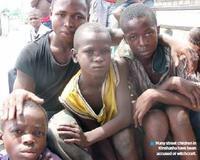The report, titled ‘Responding to beliefs that harm children’, has been published by the Stop Child Witch Accusations (SCWA) steering committee. The group are calling on churches and individuals to become aware of the scale of ‘child witch’ accusations, as well as the complex issues around them, and to get involved in the fight against what the report terms ‘a crime against humanity’.

In 2006, Human Rights Watch published a report that an estimated 30,000 children lived on the streets of Kinshasa, about 70% of whom had been accused of ‘sorcery’ at home before coming to live on the streets. Further UNICEF research in 2010 showed that the situation had not improved. Children are routinely tortured and held captive due to these unfounded accusations – often made because children are being scape-goated for difficulties experienced within a family or community Howe reports that, in the DRC at least, many churches are part of the problem, rather than the solution. ‘Sadly in DRC some parts of the church have actually been at the forefront of propagating accusations of witchcraft,’ she explains. ‘We’ve seen churches holding children captive for several months; pastors ritually burning children, starving them, and praying over them violently.’ ‘The church is well respected in DRC,’ she continues, ‘and you’ve got a situation where anyone can set up a church. You don’t have to have been to Bible college or even love Jesus. And if you start claiming you can perform deliverance rites, you’re on to a winner. Some of them even think they’re doing the right thing, because the idea of witchcraft is so culturally normalised. They believe they really are delivering these children of evil spirits.’
The SCWA group are now focusing on a programme of education and training for these churches. Howe says SCWA wants to ‘come alongside these churches to start to try and teach and train and inform through participatory approaches to learning; to start to change hearts, minds and understanding. We’d love to see the churches trained in child protection, children’s rights, and God’s heart for children. Over the last couple of years BCT’s partner EPED has trained a couple of hundred churches in Kinshasa, and we now have a core of about 40 churches in the city, who are starting to care for children at risk, and who are starting to train and influence other churches. We want to see churches becoming agents of change on the ground in the DRC, to guide them through a process of learning and change to start to overcome stigma, fear and discrimination and to bring this to an end.’
Thankfully, instances of Child Witch Accusations are relatively rare in the UK, with approximately 83 known incidents in the last decade (including the high profile cases of Victoria Climbié and Kristy Bamu), although it is believed that this is just the tip of the iceberg. But we’re still relatively ignorant of the scale of the issue overseas. Howe hopes that through the publication of the call to action, churches in the global North and in African nations will be motivated to action. In terms of how Christians can directly respond, Howe says ‘We’re asking people to go to stop-cwa.org to read more information and our vision paper, and to inform others about it; to pray into this issue, and to give financially.’
Howe also urges Youth and Children’s workers to have ‘a greater awareness of the children coming into their churches, particularly when children are from communities where this issue is prevalent. CCPAS and AFRUCA afruca.org run training courses and are very involved in raising awareness. You just need an understanding of these issues; if you suspect abuse, don’t be afraid to go through your child protection procedures or seek advice.




























